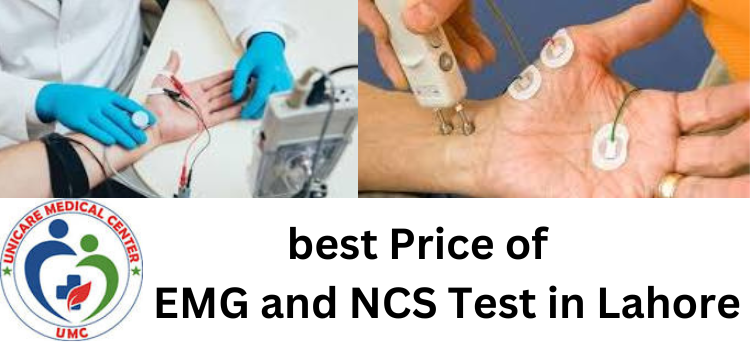If you’re experiencing any type of pain or extremity weakness in your arms, legs, or shoulders that can’t be explained by a typical medical visit—an EMG and NCS test may provide the answers you need. These tests are conducted at the Unicare Medical Center in the best possible manner. These neurological tests use electrical signals to assess muscle function and nerve conduction, allowing doctors to accurately detect neuromuscular disorders.
In this post, we’ll explain what an EMG and NCS test is along with more details about their procedure so that you can make an informed decision if either is recommended to you.
What is an EMG Test?
An electromyogram (EMG) test measures the electrical activity produced by your muscles. This test can help diagnose a wide variety of muscle and nerve disorders, such as muscular dystrophy, neuropathy, and myasthenia gravis. During an EMG test, a small needle electrode is inserted into several muscles to record the electrical activity generated by your muscles at rest and during contraction.
The test may cause slight discomfort, but it is generally well tolerated. The Unicare Medical Center has a team of the best doctors who will analyze the results to determine if there are any abnormalities in muscle function or nerve conduction.
What is an NCS Test?
A nerve conduction study (NCS) measures how well your nerves send electrical signals to your muscles. This test is often used to diagnose conditions like carpal tunnel syndrome, peripheral neuropathy, and nerve injuries. During an NCS test, small electrical shocks are delivered to specific nerves while electrodes record the response from your muscles.
Similar to an EMG test, the procedure may cause some discomfort but is generally not painful. Your doctor will analyze the results to determine if there are any issues with nerve function or conduction. At Unicare the doctors prioritize the comfort zone of the patients and conduct these tests in the best possible manner.
Preparing for the Test
Before an EMG and NCS test, your doctor may ask you to avoid using lotions, oils, or creams on your skin. These substances can interfere with the electrodes used during the tests. You may also be asked to stop taking certain medications that could affect the results of the tests.
It’s important to communicate with your doctor about any medications you are taking and follow their instructions carefully. Additionally, it may be helpful to wear loose-fitting clothing to the test so that electrodes can easily be placed on your skin.
What to Expect During the Test
An EMG and NCS test typically takes around 30-60 minutes to complete. During the test, you will be asked to lie still on an exam table while electrodes are placed either on your skin or in your muscles. These electrodes will measure the electrical activity of your muscles and nerves. Your doctor may also use a small shock to stimulate your nerves and record the response from your muscles.
The test is generally well tolerated, although you may experience some mild discomfort or tingling sensations. If at any point during the test you feel uncomfortable, be sure to let your doctor know.
After the Test
After an EMG and NCS test, you may experience some mild discomfort or soreness at the needle insertion sites. This should subside within a day or two. Your doctor will review the results with you and discuss any next steps if necessary.
If you experience any unusual or severe symptoms after the test, it’s important to contact your doctor immediately.
Conclusion
An EMG and NCS test can provide valuable information for diagnosing muscle and nerve disorders. These tests are safe, non-invasive, and help doctors accurately pinpoint the source of pain or weakness in your extremities.
If you’re experiencing any unexplained pain or weakness, talk to your doctor about whether an EMG and NCS test may be right for you.Early detection and treatment of these conditions can lead to better outcomes, so don’t hesitate to seek medical attention if needed.


